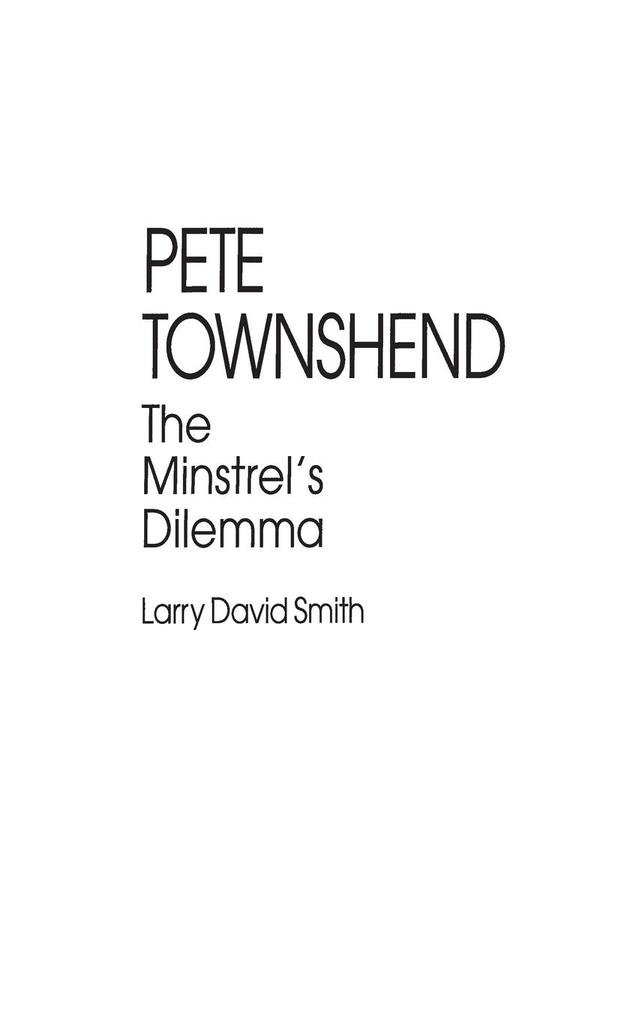
Zustellung: Sa, 28.06. - Mi, 02.07.
Versand in 1-2 Wochen
VersandkostenfreiBestellen & in Filiale abholen:
Smith explores Pete Townshend's artistic struggle between his own creative impulses and those of the commercial public. Faced with a modern version of the minstrel's dilemma, Townshend, early in his career, ignored his creative instincts to satisfy commercial agendas. After his success, he slowly withdrew to resolve his conflict between creativity and commercialism. Townshend's creative vision unfolds against the conflicts and compromises battled with the entertainment industry. A common theme, that of the seeker, weaves throughout the various phases of Townshend's career and highlights his own quest for complete artistic expression free from compromise.
In The Minstrel's Dilemma, Townshend is shown as a musician confronting the same battles begun by early minstrels and later fought by composers such as Beethoven and Mozart. He is referred to as a rock auteur, creating music that reflects his personal experiences and creative views. He is called a seeker, in search of artistic freedom toward personal expression. And at the end of his thirty-year struggle he is a true artist, able to live up to audience expectation while attending to his own artistic impulses.
In The Minstrel's Dilemma, Townshend is shown as a musician confronting the same battles begun by early minstrels and later fought by composers such as Beethoven and Mozart. He is referred to as a rock auteur, creating music that reflects his personal experiences and creative views. He is called a seeker, in search of artistic freedom toward personal expression. And at the end of his thirty-year struggle he is a true artist, able to live up to audience expectation while attending to his own artistic impulses.
Inhaltsverzeichnis
The Minstrel's Dilemma
Preface
Introduction
The Auteur, the Impulse, the Oeuvre
The Minstrel's Struggle
The Singles Period
The Opera Period
The End of the Who
The Minstrel's Resolution
The Solo Career: The Impulse's Opportunity
The Solo Career: The Impulse's Victory
The Minstrel's Dilemma: The Case of Pete Townshend
References
Index
Preface
Introduction
The Auteur, the Impulse, the Oeuvre
The Minstrel's Struggle
The Singles Period
The Opera Period
The End of the Who
The Minstrel's Resolution
The Solo Career: The Impulse's Opportunity
The Solo Career: The Impulse's Victory
The Minstrel's Dilemma: The Case of Pete Townshend
References
Index
Produktdetails
Erscheinungsdatum
30. März 1999
Sprache
englisch
Seitenanzahl
320
Autor/Autorin
Larry Smith
Verlag/Hersteller
Produktart
gebunden
Gewicht
646 g
Größe (L/B/H)
240/161/22 mm
ISBN
9780275964726
Entdecken Sie mehr
Pressestimmen
?Larry David Smith's new book recognizes Pete Townshend as a 'rock auteur.' It is an excellent and extensive academic study of Mr. Townshend's personal artist's dilemma....The book...leaves us with a warm and healthy understanding of Pete Townshend, his work and career, and an honest desire to follow the artist's future projects in multimedia musical theater.?-Text and Performance Quarterly
Bewertungen
0 Bewertungen
Es wurden noch keine Bewertungen abgegeben. Schreiben Sie die erste Bewertung zu "Pete Townshend" und helfen Sie damit anderen bei der Kaufentscheidung.








